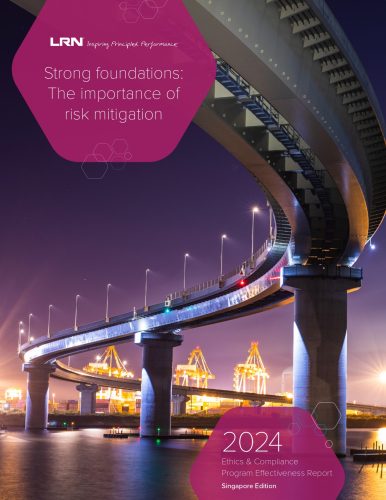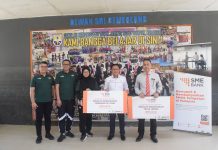LRN Corporation, the leader in ethics and compliance solutions that inspire principled performance, has published its 10th Annual Ethics & Compliance (E&C) Programme Effectiveness Report that provides insight into the foundations of ethical culture in organisations and highlights the critical differentiators that make some ethics & compliance (E&C) programmes more effective than others.
LRN’s Report found that organisations in Singapore compare favourably to global counterparts on ethics and compliance – amongst several key areas, they were found to be more effective at improving their E&C programmes and adopting new training methods, took action on ethical issues more frequently, hold values and compliance in higher regard during their decision-making processes in comparison to the global average.
Singapore’s commitment to ethical governance and regulatory compliance
The report reveals that in Singapore, 90% of surveyed organisations made challenging decisions aligned with their values in the past year—a significant 20% higher than global and APAC averages. Emphasizing their dedication to Ethics and Compliance (E&C), 72% indicated that their boards actively adjusted or abandoned initiatives based on compliance factors, again surpassing the global and APAC averages by 20%. This includes walking away from deals with ethically questionable partners, showcasing their commitment to ethical considerations in business choices.
Singaporean organisations excel in implementing incentives and disincentives for ethical behavior compared to global and APAC counterparts. They integrate these considerations into measuring management performance (87% in Singapore; 79% globally), hiring (82% in Singapore; 72% globally), promotion (79% in Singapore; 67% globally), and bonus awards (73% in Singapore; 60% globally).
Impressively, 75% factor ethical behavior into promotion and bonus considerations, with 60% reporting termination or discipline of executives or high-performing employees for unethical conduct in the past year—significantly higher than the global and APAC averages of 40%.
Key standouts of high-performing E&C programmes
In Singapore, high-performing E&C programmes show significant differences when compared to low-impact ones. The Report identified that 100% of high-performing programmes in Singapore report that the compliance function has resources comparable to other key risk functions, whereas less-effective programmes report parity only 77% of the time.
High-performing programmes are also 1.2 times more likely to have the resources, authority, and reach to effectively mitigate risk and raise concerns directly to their board, with the former 2 times more likely to report to the chief executive officer of their organisations.
Apart from resources, continuous improvement is a hallmark of a better-performing E&C programme. In Singapore, high-performing programmes update their codes based on lessons learned from investigations at a rate nearly 30% greater than less effective programmes.
Additionally, 98% of high-performing programmes report making changes to their E&C programmes to adapt to remote and hybrid working environments — twice more than less-effective programmes that report the same (50%).
This Report from LRN marks the 10th anniversary of the landmark report and is based on a survey of more than 1,400 E&C professionals at companies and organisations in 19 different countries and 26 industries across North America, Europe, and Asia-Pacific, including 112 companies in Singapore.
Areas for Improvement
Even as many continuously seek to improve their E&C programmes, Singapore organisations still face several challenges in doing so. These challenges include the need to upgrade internal systems for better training (81%), the integration of compliance after merger & acquisition activity (75%), addressing staff shortages for compliance (73%), budget constraints (69%), and increasingly complex regulations (70%).
The report identified a gap between senior and executive managers and middle managers with regard to E&C. Only roughly one-third (34%) have reported taking on difficult decisions based on company values and purpose as compared to 90% of senior and executive managers who have done so.
Middle managers also lag behind in identifying E&C risks and challenges, integrating E&C into decision-making, and ensuring that high performers are held accountable for misconduct.
“This year’s report shows that companies in Singapore are committed towards maintaining high E&C standards. They have taken action on ethical issues at a higher rate than worldwide peers and lead their global counterparts across several E&C metrics,” said Eric Morehead, Director, Advisory Service Solutions at LRN and lead author of the Singapore report.
“With organisations in Singapore continuing to adapt to the emergence of artificial intelligence tools, hybrid working models, as well as an increasingly complex regulatory environment, it’s clearer than ever before that high-performing E&C programmes must focus on values, adapt to change, and emphasise personal accountability.”















